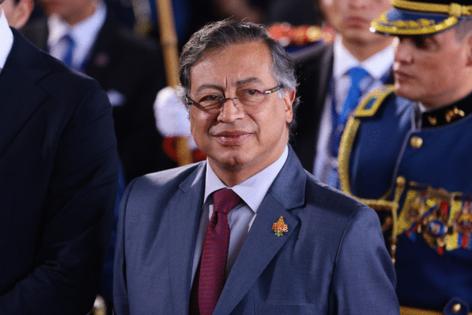Trump faults Petro, lists Colombia as rogue drug nation
Published in News & Features
The U.S. has “decertified” Colombia as a partner in the war on drugs amid the biggest cocaine boom in history.
The move is likely to hit foreign investment, multilateral funding and tourism, as a long-time ally of Washington now finds itself in the same rogue category as Venezuela, Bolivia, Afghanistan and Myanmar.
“The U.S. is decertifying us,” Colombia President Gustavo Petro said in a televised Cabinet meeting on Monday evening. “After dozens of deaths, police, soldiers, common people, trying to avoid cocaine from getting to them.”
Colombia has been among the biggest recipients of U.S. aid this century, receiving about $14 billion, including military assistance to battle drug cartels and Marxist insurgents. However, relations between President Donald Trump and Colombia’s leftist president quickly soured, with the two leaders having very different approaches to the war on drugs, migration and relations with Venezuela.
Trump, in a presidential determination, laid blame for the move with Petro, faulting Colombia’s government for not stopping the production increases, as well as Petro’s “failed attempts to seek accommodations with narco-terrorist groups.”
“The failure of Colombia to meet its drug control obligations over the past year rests solely with its political leadership,” Trump said.
The White House stopped short of requiring that U.S. aid be halted, including in the determination a waiver stating that U.S. assistance remains a vital national interest.
However, the decision could potentially slash tourism revenue by as much as $1 billion annually if the U.S. were to intensify its travel warnings for Colombia, according to a study by the Colombian-American Chamber of Commerce published in August.
It could also lead to reduced bilateral cooperation, a fall of as much as 60% in access to credit from multilateral lenders, and might spook foreign investors, the study found.
Even so, the economic damage is limited by the fact that U.S. aid is no longer as significant for Colombia as it was at the start of the century, according to Adam Isacson, who studies U.S.-Colombia policy at the Washington Office on Latin America.
Since taking office in 2022, Petro has sought “total peace” through negotiations with guerrillas and the private armies of drug traffickers. The strategy has so far failed to yield significant demobilizations, though talks are far advanced with some groups.
Colombia now produces more than six times as much cocaine as it did in 1993, the year when Pablo Escobar was gunned down. Cultivation of coca bushes in Colombia rose 10% last year to 253,000 hectares — enough to produce more than 2,600 tons of pure cocaine, which is far more than the output of Peru and Bolivia combined.
Bogata’s embassy in Washington said in a statement on X that the U.S. and Colombia will still work together to battle narcotrafficking, while rejecting the Trump administration’s depiction of its efforts.
“The U.S. determination granted an exception that allows bilateral cooperation to continue,” the embassy said. “This decision reaffirms the importance of our joint work.”
Petro’s presidential term ends in less than a year, and he’s not eligible for reelection. The pressure from the U.S. will give an opening to candidates who criticize Petro’s approach to the drug war and advocate tougher tactics.
Trump said he would be willing to consider changing the designation if Colombia shifted to a “more aggressive” posture against drug traffickers including working with the U.S. to “bring the leaders of Colombian criminal organizations to justice.”
U.S. Secretary of State Marco Rubio, speaking to reporters Tuesday in Israel, echoed that sentiment, saying Colombia could be recertified if it cooperated more with the U.S.
“Colombia has been a great partner, historically,” he said. “Unfortunately, they have a president now that, in addition to being erratic, has not been a very good partner when it comes to taking out drugs.”
-------------
—With assistance from Eric Martin.
©2025 Bloomberg L.P. Visit bloomberg.com. Distributed by Tribune Content Agency, LLC.







Comments